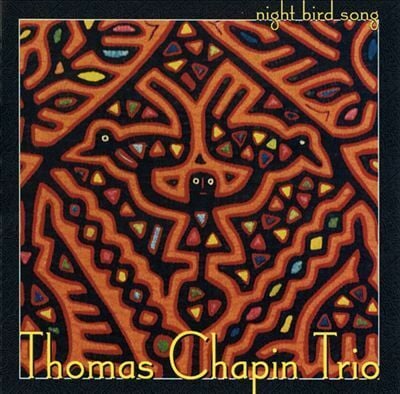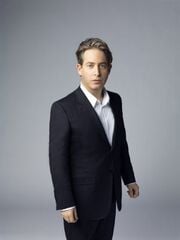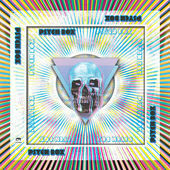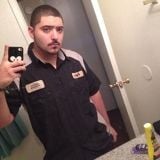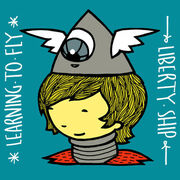New York, NY (Top40 Charts) Showcasing the late
Thomas Chapin's extraordinary life and the indelible mark he made on fans, peers and the jazz world-at-large, Emmy-winning filmmaker
Stephanie J. Castillo will present an Advance Screening of THOMAS CHAPIN, NIGHT BIRD SONG. The new music documentary film will have its first public viewing on Sunday, March 6, 2016 at the Real Arts Way in Hartford, Connecticut at 2 p.m. A special concert will follow the screening that evening. Ticket sales are at www.realartways.org.
This advance screening will occur three days before
Thomas Chapin's birthday; he would have been 59 on March 9. Expected to be among the ticket-holders will be many of Chapin's faithful fans, friends, and family and film donors from his native Connecticut who are expected to attend the screening to remember him and to celebrate the
Thomas Chapin they knew and loved. That night and after the film screening's dinner break, ticket holders for the special concert to follow will experience
Thomas Chapin's music live and will surely come to better understand the depth of his talent and intense genius in composing Chapin possessed. The
Thomas Chapin Brass
Music ,conducted by Dave Ballou, features
Mario Pavone, Michael Sarin,
Peter McEachern, Marty Ehrlich, Tony Malaby, Art Baron, Ben Stapp, and Nick Roseboro. Pavone and Sarin are from the original
Thomas Chapin Trio.
Hartford, Connecticut is where it all started for
Thomas Chapin — growing up in nearby Manchester, playing in clubs as a teenager and throughout his career. From here, Chapin also headed off to Phillips Academy Andover where he discovered the sax; attended the Hartt School of
Music at the University of Hartford; left for Rutgers University/Livingston College where his formal jazz studies intensified; and then launched off into a career that began with a 6-year stint in the Lionel Hampton Band where he was musical director and lead alto sax. In 1998, battling leukemia, Chapin returned to Manchester for his last performance before passing away 12 days later on Feb. 13, 1998 at age 40 from his year-long struggle.
ABOUT THE FILM: Advance viewers who have watched THOMAS CHAPIN, NIGHT BIRD SONG say there is an immediate sense that Chapin made a profound difference in the lives of the people that knew and worked with him.
A dynamic, powerful and engaging performer, he is painted in this intimate film as a musical explorer who pushed and transcended the boundaries of jazz and dissolved the distinctions between sound and music.
Chapin left behind an avid group of worldwide fans and supporters, along with a collection of recordings that include original compositions with sounds as relevant today as they were when he first recorded them.
In NIGHT BIRD SONG, Castillo draws from her more than 40 on-camera interviews conducted with world renowned luminaries in the world of jazz and music, including jazz broadcaster Alex Dutilh of
Radio France Musique; Paul H. Jeffrey, the late Professor Emeritus, who mentored
Thomas while teaching at both Hartt School of
Music and Rutgers
Livingston College; Dr. Larry Ridley Chairman, Rutgers/Livingston
Music Department;
Mario Pavone,
Thomas Chapin Trio bassist (also an Associate Producer on the film); fellow musicians, among them
Peter McEachern, Bob Musso, Arthur Kell, Saul Rubin, Su Terry, Walter Thompson, Marty Erhlich and
Pablo Aslan; jazz legends Ray Drummond and Kenny Barron; City Winery's Michael Dorf (also an Associate Producer on the film) a New York entrepreneur, impresario and philanthropist; music promoters
Danny Melnick, Bruce Lee Gallanter and Joel Chriss; and writers/music critics Bob Blumenthal, Larry Blumenfeld, Frank Van Herk and Gene Seymour. The director also shares personal stories from
Thomas Chapin's family and friends, including Ted Chapin, Thomas's brother; Terri Castillo Chapin, Thomas's wife; and Gil Barretto, Thomas's spiritual counselor.
On various shoot locations, Castillo's photographers filmed on Canon FX Series cameras, shooting high-definition footage. The principal photography was done by New York City cinematographer Hugh Walsh. Over a two-year period, the film shoots took place in Manhattan, Brooklyn, Hartford, Phoenix, and Tucson and in
Europe (France, Germany, Italy and the Netherlands).
When asked why she made the film, Castillo said, "Thomas Chapin was my brother-in-law, and I knew he played music, but I had no idea that he was somebody in jazz until I read his obituary in the New York Times. After my research, I realized what an incredible opportunity I had to bring Thomas's story and music to a world that might have never known him or might have forgotten him. I wanted to invite those who have never heard of
Thomas Chapin to take the time to discover his genius, which came out through his music. I also wanted them to discover, as I had in making this film, the depth of talent, dedication and passion this man had about life and music. I was convinced his story would have the power to lift us all! And so in 2012, I set out to tell his story and to truly honor him, his music and his life, and to ensure his legacy."
The forty-two interviews that made the final cut in the film's 150-minute Showcase Version for premieres and showcases form the narrative backbone for film's structure and are interwoven with a series of
Thomas Chapin performance concerts from archived footage and audio recordings stored at
Thomas Chapin's archives at Duke University.
Castillo also gathered performance footage from several jazz festivals, including the 1995 highly-acclaimed performance of the
Thomas Chapin Trio at the Newport Jazz Festival; from various performance venues, including Michael Dorf's Knitting Factory; and from friends and fans who had videotaped live performances, primarily in Connecticut.
Castillo spent a year scripting the film with co-writer and co-producer Noel "Sonny" Izon, her long-time filmmaking partner. His prolific documentary work includes nationally televised programs produced mainly for PBS and for
National Geographic Television.
Castillo edited the film herself, ensconcing herself for 8months in the quiet haven of Belmont, Vermont. Her final post-work on graphics, titles and a stereo soundtrack was done by editors in Honolulu, Hawaii this past December.
MORE ABOUT CHAPIN: Initially Chapin spent a good portion of his time performing and working with the important names in various factions of jazz. Aside from Hampton, he performed with
Chico Hamilton, John Zorn, Dave Douglas, Ned Rothenberg, Marty Ehrlich, Walter Thompson,
Pablo Aslan, Ray Drummond, Betty Carter, Ronnie Mathews, Peggy Stern, Tom Harrell, Anthony Braxton and many more. For nearly 10 years, Chapin pursued his own music as band leader and composer, working with his various ensembles at festivals and clubs around the world. Chapin's various bands and recording projects included work with The
Thomas Chapin Trio, The
Thomas Chapin Trio Plus Brass, Plus Strings, The
Thomas Chapin Quartet, Spirits Rebellious, ZASIS, and Machine Gun. People that were lucky enough to have known him and/or attend one of his concerts were mesmerized by his inner and outer beauty and with his iridescent and inherent relationship to his instrument, through his body, mind and soul.
His impact made on the lives of all that came in contact with him is still spoken about. Laurence Donohue-Greene, Managing Editor of The New York City Jazz Record, recalls, "Thomas performing at Newport in 1995…. That was a life highlight in music for me. Over 20 years ago, and I vividly remember that set to this very day as still being one of the greatest Newport Jazz Festival sets I've ever seen."
The film's title NIGHT BIRD SONG is from a
Thomas Chapin Trio's signature tune inspired by the striking melodic turns of a bird's song that Chapin heard while on a midnight walk. Composed and arranged by Chapin and his bassist,
Mario Pavone, the title evokes the arc in his music career that reveals he was solidly rooted in tradition yet straining its boundaries at every turn. Jazz critic Larry Blumenfeld shares about the arc, "The arc corresponds less to common categories of 'downtown,' 'mainstream' and more to the flight paths of birds Chapin seemed to favor in song titles. With grace and individuality, Chapin took us to places—lofty and striking and sometimes dangerous—that forced a change of perspective." Filmmaker Castillo believes the film will take us to those same places.
ABOUT THOMAS CHAPIN: Alto saxophonist and flutist,
Thomas Chapin was born on March 9, 1957 and died of leukemia in 1998 at age 40. Born in Manchester, Connecticut, he attended Phillips Academy in Andover, Massachusetts where he studied classical music and jazz. He began his serious studies in the late 1970s, attending the Hartt School of
Music at the University of Hartford in Connecticut and studying with bebop legend, saxophonist Jackie MacLean.
In 1980, Chapin graduated from Rutgers University where he was mentored by saxophonist Paul Jeffrey and studied with pianist Kenny Barron, saxophonist
James Spaulding and guitarist Ted Dunbar. From 1981 to 1986, he toured the world with big band master Lionel Hampton as his lead alto saxophonist and musical director. The New York Times said of Chapin that he was one of the more exuberant saxophonists and bandleaders in jazz" and "one of the few musicians to exist in both the worlds of the 'downtown' experimentalist scene, and mainstream jazz."
ABOUT STEPHANIE CASTILLO:
Stephanie J. Castillo, a former newspaper journalist who wrote for the Honolulu Star-Bulletin in the 1980's, is from Hawaii but has been fundraising and traveling full-time for four years to complete NIGHT BIRD SONG by the start of 2016. She heads a Hawaii-based production company 'Olena Productions with partners in Washington D.C., and Los Angeles. Currently she is based in Brooklyn to set up the film's premieres and screenings. She is available for interviews at
[email protected] and welcomes reviews of the film from the press community. Her 30-year filmmaking career alone is worth a look, should any media be interested in doing a profile article. For filmmaker Castillo's personal website and for information about her other films, go to https://www.olenamedia.com.
ABOUT REAL ART WAYS: Real Art Ways is an alternative multidisciplinary arts organization that presents and supports contemporary artists and their work, facilitates the creation of new work, and creatively engages, builds, and informs audiences and communities.
Real Art Ways is a 501(c)3 non-profit organization that depends on the support of its members and community to continue delivering on its mission of innovative exhibitions and programming.
FOR MARCH 6 TICKETS: Real Art Ways, 56 Arbor Street, Hartford, CT 06106 Phone: 860-232-1006 www.realartways.org.
PRESS CONTACT AT REAL ART WAYS: Katy Witmer, Communications Manager,
[email protected], 860-232-1006 x 109
A FREE SCREENING IN NEW YORK CITY at the SVA Theatre is set for Sunday, March 13 - 333 West 23 Street, NY, NY 10010.For Donors, Supporters and the Public.
Doors open at 1 p.m.; the film begins 1:30 p.m. RSVP TO:
[email protected] RSVPs required. For other questions, email
[email protected] or
[email protected]
THE FILM'S WEBSITE: https://www.thomaschapinfilm.com/
TO VIEW THE FILM'S 7-MINUTE TRAILER, GO TO: https://www.youtube.com/watch?v=xvWHsVSoPME
FOR FILM SCREENING INFORMATION: Contact the film's Associate Producer and film's screening coordinator, Abby Lincoln-Crawford at
[email protected].
PR CONTACT: Denise Marsa, KeyMedia Public Relations: Cell: 347- 224-2295, E-mail:
[email protected]; www.keymediapublicrelations.com
ABOUT KEYMEDIA PUBLIC RELATIONS: KeyMedia Public Relations is a New York City-based Public Relations and Production Company with a Focus on the Performing Arts, Health & Wellness and Non-Profits. Its owner, Denise Marsa, is an award winning international recording artist, producer and songwriter.
WWW.THOMASCHAPIN.COM















